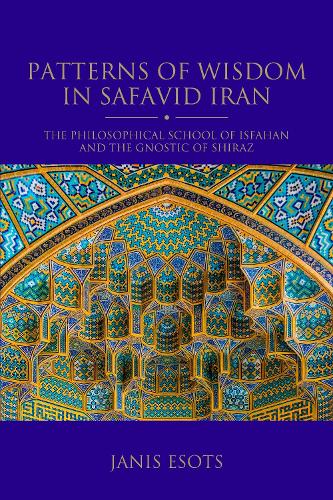
Patterns of Wisdom in Safavid Iran: The Philosophical School of Isfahan and the Gnostic of Shiraz
(Paperback)
Available Formats
Publishing Details
Patterns of Wisdom in Safavid Iran: The Philosophical School of Isfahan and the Gnostic of Shiraz
By (Author) Janis Esots
Bloomsbury Publishing PLC
I.B. Tauris
13th January 2022
United Kingdom
Classifications
Tertiary Education
Non Fiction
Middle Eastern history
181.07
Physical Properties
Paperback
280
Width 154mm, Height 234mm, Spine 22mm
457g
Description
The exceptional intellectual richness of seventeenth-century Safavid Iran is epitomised by the philosophical school of Isfahan, and in particular by its ostensible founder, Mir Damad (d. 1631), and his great student Mulla Sadra (aka Sadr al-Din Shirazi, d. 1636). Equally important to the school is the apophatic wisdom of Rajab 'Ali Tabrizi that followed later (d. 1669/70). However, despite these philosophers renown, the identification of the 'philosophical school of Isfahan' was only proposed in 1956, by the celebrated French Iranologist Henry Corbin, who noted the unifying Islamic Neoplatonist character of some 20 thinkers and spiritual figures; this grouping has subsequently remained unchallenged for some fifty years. In this highly original work, Janis Esots investigates the legitimacy of the term 'school', delving into the complex philosophies of these three major Shi'i figures and drawing comparisons between them. The author makes the case that Mulla Sadras thought is independent and actually incompatible with the thoughts of Mir Damad and Rajab Ali Tabrizi. This not only presents a new way of thinking about how we understand the school of Isfahan, it also identifies Mir Damad and Rajab Ali Tabrizi as pioneers in their own right.
Reviews
It is a highly useful contribution that will be telling and should be widely adopted in classes and read with avid interest by those seeking to make sense of the broader intellectual history of Islamic philosophical traditions into the modern period. * The Muslim World Book Review *
Author Bio
Janis Esots is a Research Associate at the Institute of Ismaili Studies, London, UK and Associate Professor at the Department of Asian Studies, University of Latvia, Latvia. His research focuses on Ismaili thought and the so-called philosophical school of Isfahan (Mulla Sadra, Mir Damad, and Rajab Ali Tabrizi). He is the managing editor of Encyclopedia Islamica and the editor of the Islamic Philosophy Yearbook, Ishraq.
